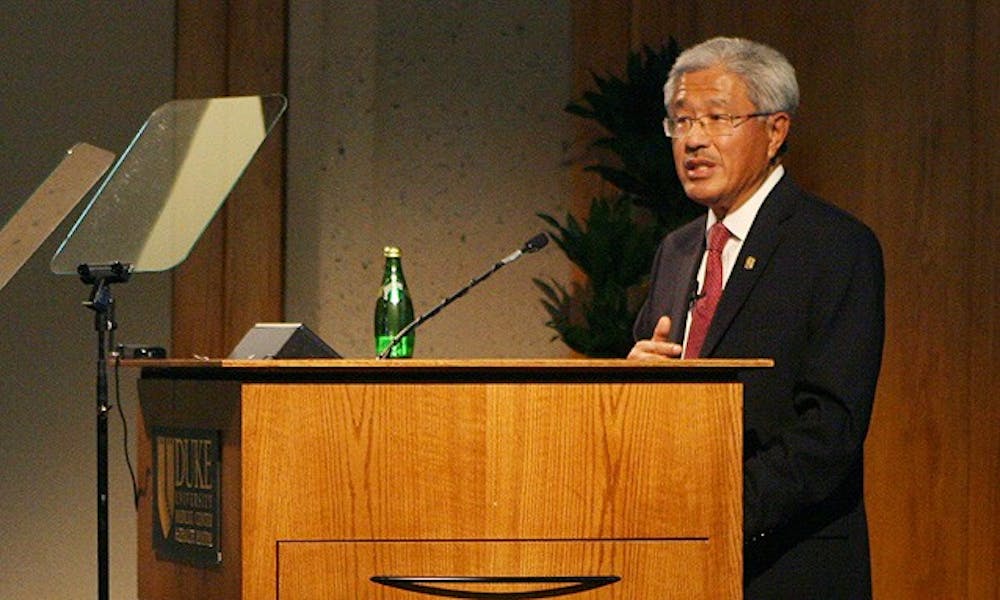Dr. Victor Dzau stressed a positive future for Duke Medicine with the start of a new five-year strategic plan at the yearly State of Duke Medicine address.
Dzau, chancellor for health affairs and president and chief executive officer for the Duke University Health System, addressed a large audience of medical staff in Searle Center Lecture Hall Monday, outlining ambitious priorities despite uncertain times ahead for the medical community stemming from the changes to national health care policy and the remnants of one of the worst economic downturns yet.
“Any strategic process is only as good as the people and the teams of people who execute it and implement it,” he said.
The plan, Dzau said, will generally follow three key categories of “decisions” to drive organization and preparedness for the health system: must-do or must-complete decisions, regret-less decisions and unclear risk or reward decisions.
The first set— falling under the category of must-do or must-complete decisions—concerned projects that have already been started prior to the new strategic plan. These include the completion of the Duke Cancer Center and the School of Medicine’s Learning Center, which is the first building to be built specifically for medical education in 80 years, and the addition of the Duke Medicine Pavilion that will “meet the expanding patient volume,” Dzau said.
He noted that according to the Association of American Medical Colleges, the medical school is in a better financial situation than the average private and public medical schools.
“It’s encouraging to see that we have the greener grasses in the medical school neighborhood,” Dzau said.
The second category, regret-less decisions, are necessary for future success regardless of environmental factors. He added that some of the plans in this category were those that were “put on hold because of the economic collapse,” but are now being reevaluated as the economy begins to rebound.
Dzau said it is essential for the medical community to become more aligned in what he refers to as the “Power of One.” He added that employee care, updated medical technology, aggressive faculty recruitment and increases in academic support are all important for Duke Medicine’s future success.
Dzau also announced that the Health System Board of Directors recently approved the use of $50 million to launch an international search for a director of the Cancer Center through Spencer Stuart, an executive search consulting firm. Construction on the Cancer Center is expected to be completed by early 2012.
The third category of decision making is where the magnitude of the risk or reward is unclear, Dzau explained. These decisions are directly related to the uncertain nature of the path for both Duke and national health care.
Dzau’s examples of third-category decisions included additional building or leasing for academics, investment for more research space and partnerships or affiliations with other organizations.
“My concern is the many approaches that made [Duke Medicine] successful today may not be as successful in the next [several years],” Dzau said.
Toward the end of the speech, Dzau reflected on the commitment demonstrated by Duke’s medical community during the past year and briefly discussed Duke’s volunteer service in Haiti following the earthquake in January. Duke sent five relief teams to Haiti earlier this year, Dzau said, after the earthquake destroyed much of the Port-au-Prince and other settlements in the region.
Despite the health system’s entrance into what Dzau called “uncharted waters,” the general sentiment of the audience was positive about the direction in which Duke Medicine is going. Jewell Booth, a pediatric clinical nurse, said she was impressed with Duke’s international relief efforts despite a poor economy.
“It’s great Duke already contributes locally, but reaching out to international areas is pretty amazing,” said Booth, who was on one of the teams sent to Haiti.
Dzau concluded his address by quoting Duke Medicine’s mission statement, highlighting the ideas of transforming health and medicine globally and locally and also eliminating health inequalities.
“The people of Duke Medicine are as strong and well prepared as anyone to navigate the foggy future that lies ahead,” Dzau said. “By this time next year, we will have pulled ahead together to meet every challenge that comes our way.”
Get The Chronicle straight to your inbox
Sign up for our weekly newsletter. Cancel at any time.

